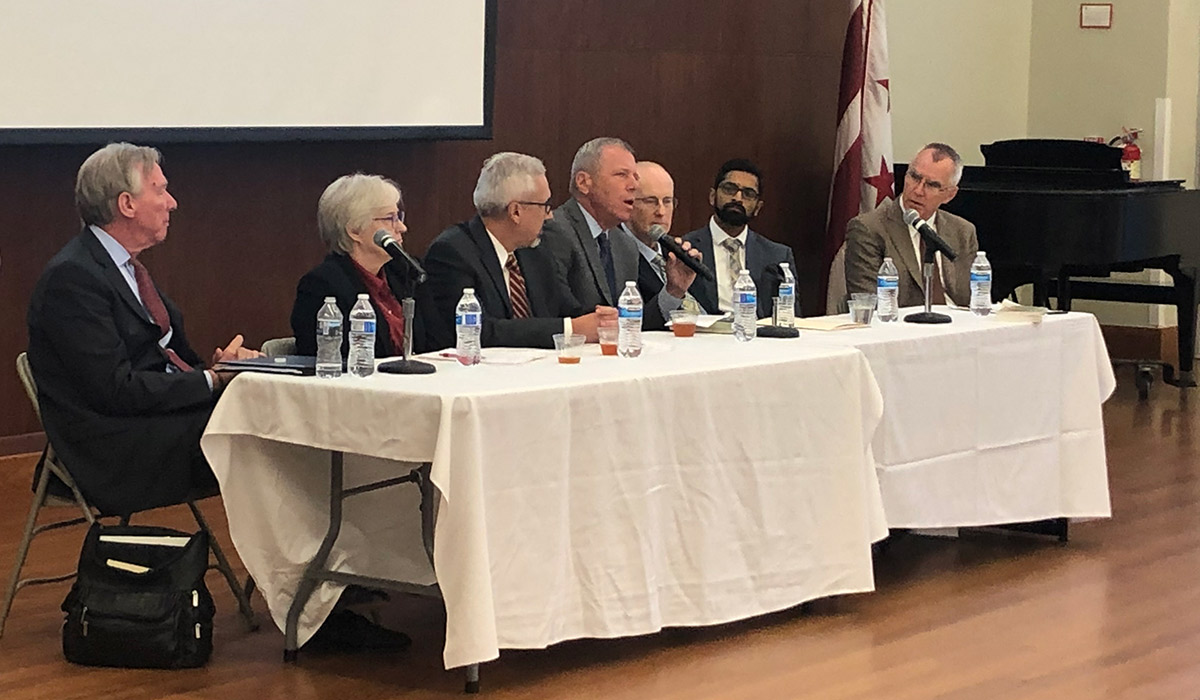

A crowd of students and professors gathered in Caldwell Auditorium on Thursday, Oct. 3, to discuss and celebrate Cardinal John Henry Newman, who will be canonized by Pope Francis on Oct.13. The conference, Sagacity and Sanctity: Newman’s Idea of a University, was hosted by the School of Theology and Religious Studies. It included two lectures about Newman’s ideas and a panel discussion.
Alex Scalco, a graduate student of Historical and Systematic Theology, attended the conference and reflected on how universities operating under Newman’s wisdom can help students to better encounter Christ.
“Newman's vision does something entirely different by grounding its students in the essential principles which allow them to ‘connect the dots’ between various fields of study so that they are not just wandering among fragments, but are instead being told a coherent story,” he said. “When they come out the other side, they are not lost, they don't feel cheated (an experience far too common to today's university graduate). Instead, they have been given a wisdom (sagacity) which puts them in touch with what they have been looking for all along, even if they didn't realize it: God.”
University President John Garvey welcomed conference participants and gave an overview of Newman’s life and works. He expressed his excitement about the upcoming canonization and how Newman has inspired him in his career.
Andrew Meszaros, of the Pontifical University, St. Patrick College, Maynooth, explored Newman’s understanding of how a university should train and teach students in his lecture titled “Philosophical Habit of Mind”: Newman and the University.
“For Newman, the university is a place that can potentially cultivate both the intellectual life and the spiritual moral life,” Meszaros said. “He wants the students to excel not only in sagacity but also in sanctity after the pattern of a medieval ideal: the university is to fit men for the world while training them for another.”
Meszaros summarized that, for Newman, a Catholic university was optimal for training students because spiritual and moral resources play an integral part in academic excellence by encouraging students to see a holistic view of the world.
“At a Catholic university an architecture student can contemplate the story of the Tower of Babel and its consequences. And all the students, whether in physics to English literature, have the ability to contemplate a real apprehension of the world’s finitude and fallenness beginning with one’s own self in an examination of conscience,” he said.
Reinhard Huetter, professor of fundamental and dogmatic theology for the School of Theology and Religious Studies, presented “The University and Its Counterfeit: Newman’s Litmus Test.” Huetter explained Newman’s thought as a litmus test for universities, saying that universities that do not incorporate theology and natural philosophy as part of their studies limit the possible scope of truth. Universities that do not incorporate this forget human beings innate desire to know.
“Human beings have the desire to know; not because they have the desire to master but because knowledge is the proper desire of the human intellect,” Huetter said.
He also explained that Newman’s litmus test can help Catholic universities form students in both sagacity and sanctity, adding that “Sagacity without sanctity stands in grave danger of turning cold, consumptus, proud, and self-serving.” When the Catholic Church is formally present at a university, then it is more possible to have sagacity and sanctity go hand-in-hand in student life and learning.
A panel of Catholic University professors gathered at the end of the conference to discuss Newman’s idea of a university and how these ideas are present at The Catholic University of America. The panel included Garvey, Law; Jean De Groot, Philosophy; Aaron Dominguez, Physics; Michael Pakaluck, Philosophy; David Walsh, Political Theory; Brandon Vaidyanathan, Sociology; and Andrew Yuengert, Economics. These professors spoke about how they have included theology and philosophy and other disciplines in their classes to teach their students about a larger world view than just the student’s major. The panel also spoke about the challenges of instituting Newman’s view into our University today.